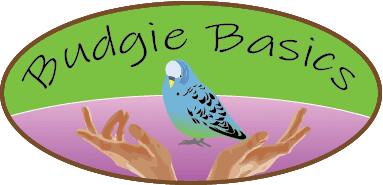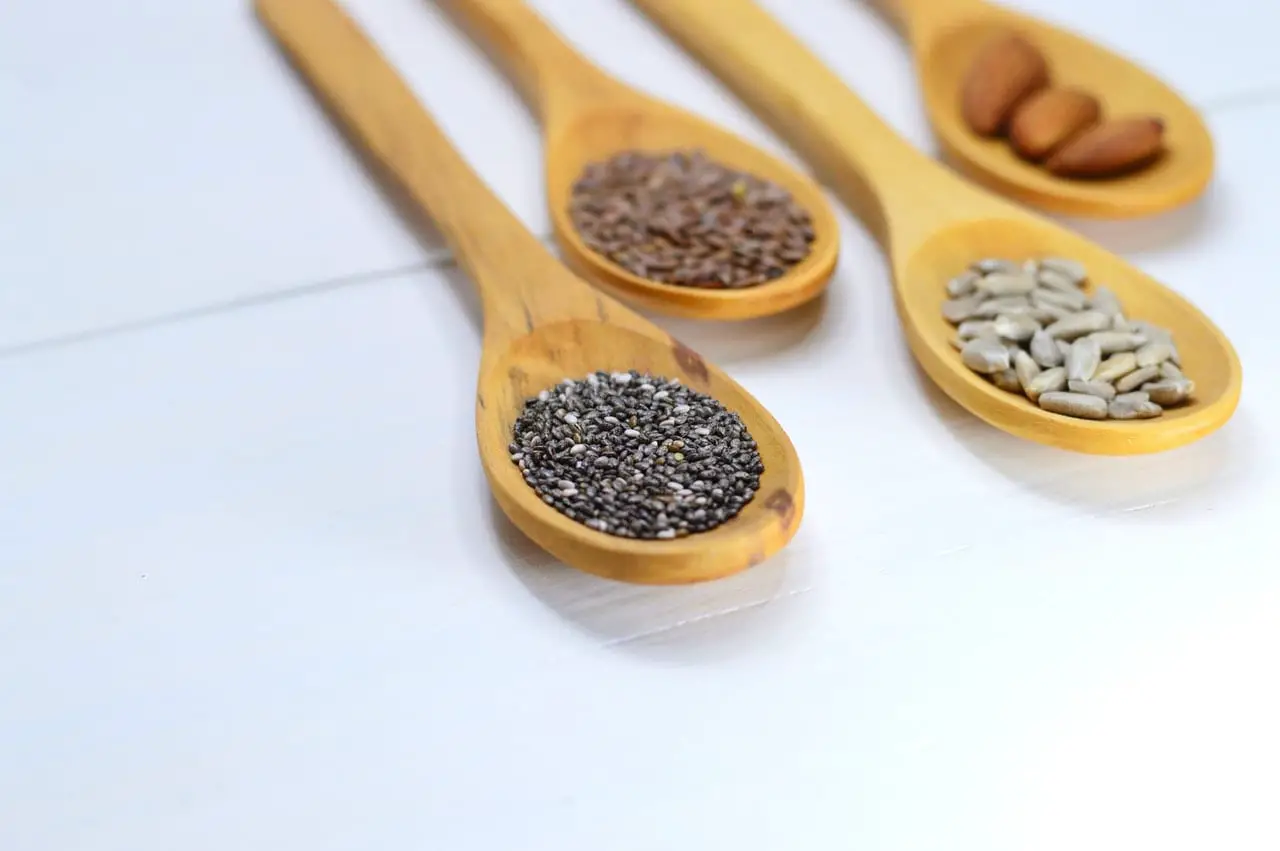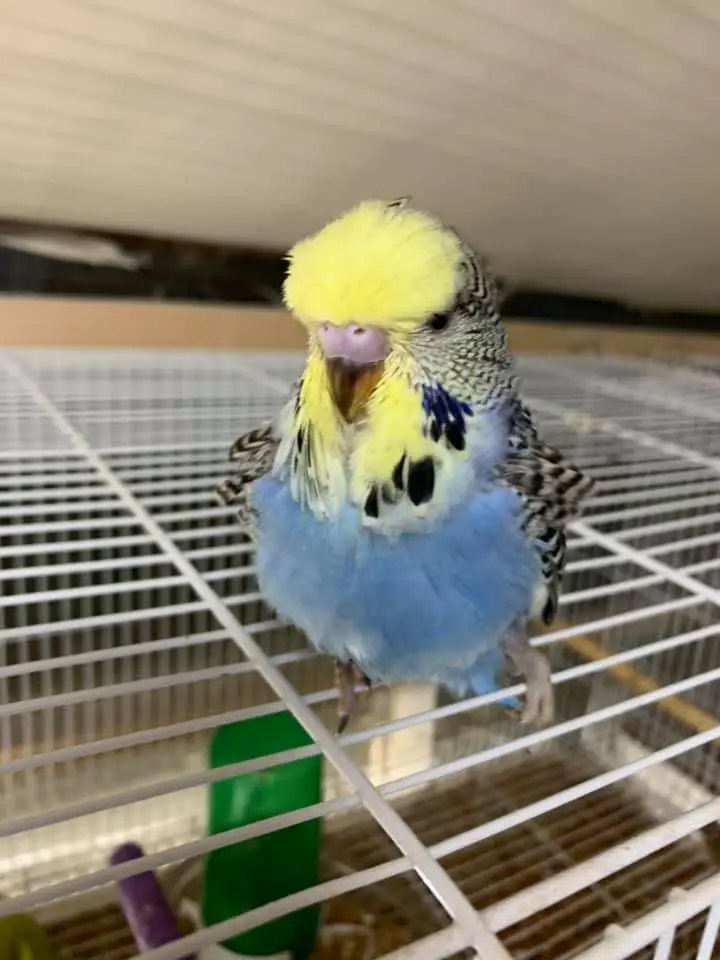If you’re anything like me, you love to spoil your animals. Especially the winged kind. However, sometimes overdoing it in the food department can be more detrimental to your pets than you think.
Budgies require a balanced diet to maintain good health and to reduce the risk of obesity, illness, and disease.
As your budgies are not in the wild and cannot follow their instincts when it comes to feeding. So, it is up to you to provide them with all the essential nutrients, vitamins, and minerals that their feathered bodies need to stay in tip-top condition.
Just like humans eat a variety of foods and cannot maintain a balanced diet by eating beans only, budgies cannot maintain a healthy diet by eating seed alone.
If you want to avoid sick budgies and costly visits to the vet, take the time to do some research and ensure that you are providing your budgies with the best diet that you can.
Often overlooked protein, is one of the critical nutrients you need to provide your budgies with.
So how much protein should you include in your budgies diet?
Studies have shown that approximately 10% of a budgies diet should be in the form of protein. And during molting season budgies may require as much as 30% of their diet to be protein.
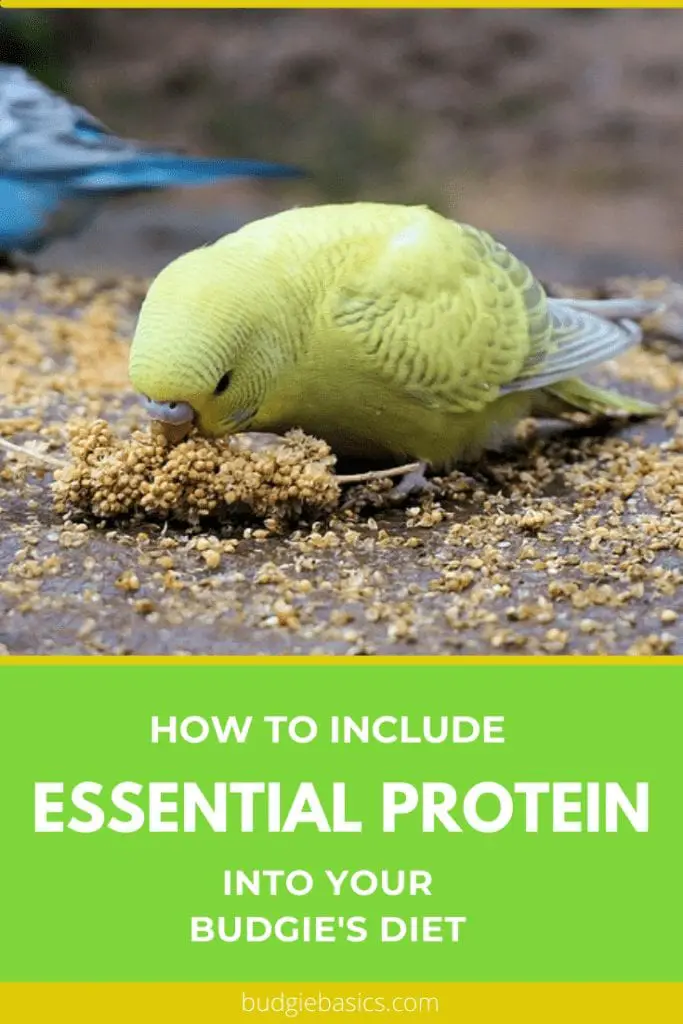

How Important Is Protein In Your Budgies Diet
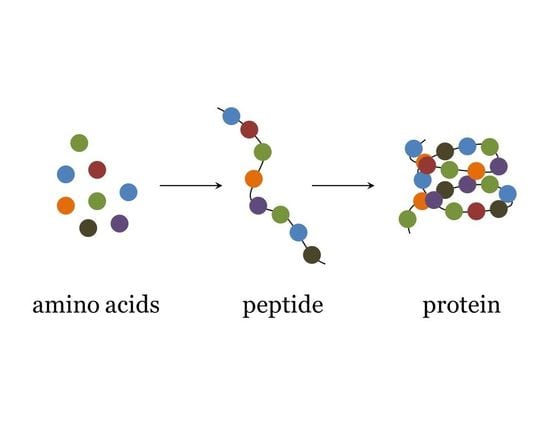

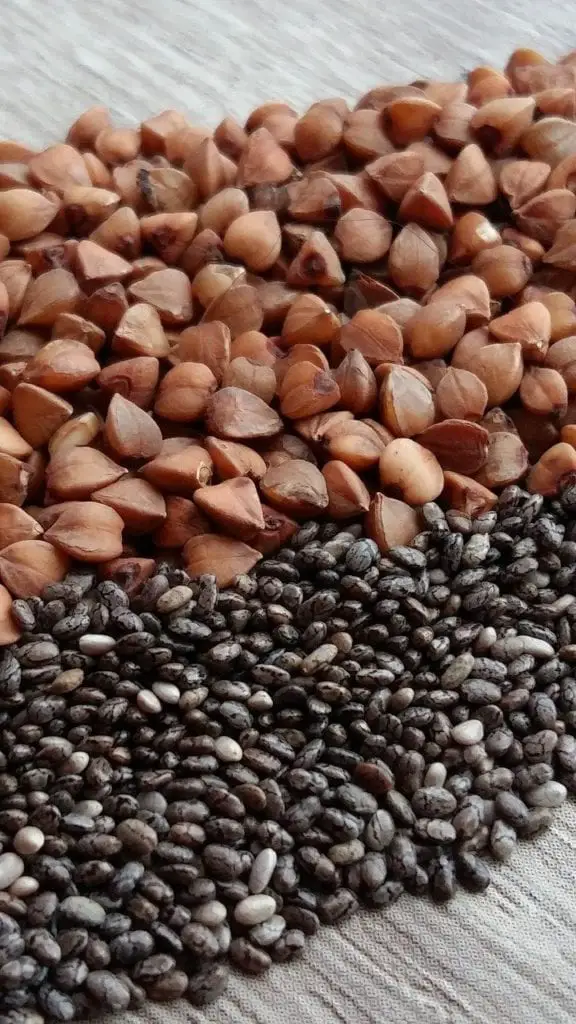

When thinking about what are the best protein sources for budgies, it is good to first understand what protein is, and why it is so important to the health of your budgies.
Proteins are the building block for muscles, and different proteins are found in various meats, grains and seeds. When your budgie eats a food containing protein, it digests the proteins into amino acids.
Think of Amino acids as string of beads that line up to create the various proteins that your budgie needs. Healthy muscle and other tissue is formed when the body strings the amino acids back together creating complex proteins, used to get big, strong and healthy.
This is why it is important to chose the best protein sources for your budgies, protein rich foods that are easy for your budgie to digest.
The amino acids and the proteins created by digesting these protein rich foods are essential for healthy feathers, bones, hormones, muscles, organs, and enzyme production.
Don’t worry about giving your budgie too much protein, it is always better to have more than not enough. If your budgie has an excess intake of protein. your budgies will convert it into energy or if it is not needed then it is metabolised into uric acid and excreted out as waste.
It will be easy for you to tell if your budgie’s diet is lacking the protein it requires, because they will start to scavenge on their bodies. Your budgie will be noticeably weaker, it be less healthy-looking and its feathers will not form properly, or it might even start to pluck them out.
What protein sources you should avoid feeding your budgie?
It is important to know which foods are good and which foods are toxic to your birds. Not all protein rich foods are going to be good to give to your budgie.
For example sunflower seeds are 21% protein but if you give your budgies too many they will get very sick.
If you want to know what you should NOT feed your budgie, check out our list of 23 surprising foods that are harmful to budgies.
Some of the amino acids that budgies require are found in a variety of the seeds that they eat, but these are small amounts and not sufficient to sustain a healthy bird.
If seed is the predominant diet of your bird or the only food that you provide, your budgies will naturally eat a considerable amount of it to try and take in the essential amino acids that it needs, and sadly will become obese. Some seeds are also very high in volatile oils that can make your budgie overheat and start plucking out their feathers.
So although seeds in themselves are not bad, they need to be fed in moderation and in conjunction with other suitable foods.
Avoid cheeses and milk product, although they are a great source of protein for humans, budgies can not stomach them.
As a general rule of thumb when it comes to feeding your budgies in general, never feed them handmade “human” food: that means no tobacco, sugar, sugar-cane, alcohol, caffeine, chocolate or processed meats.
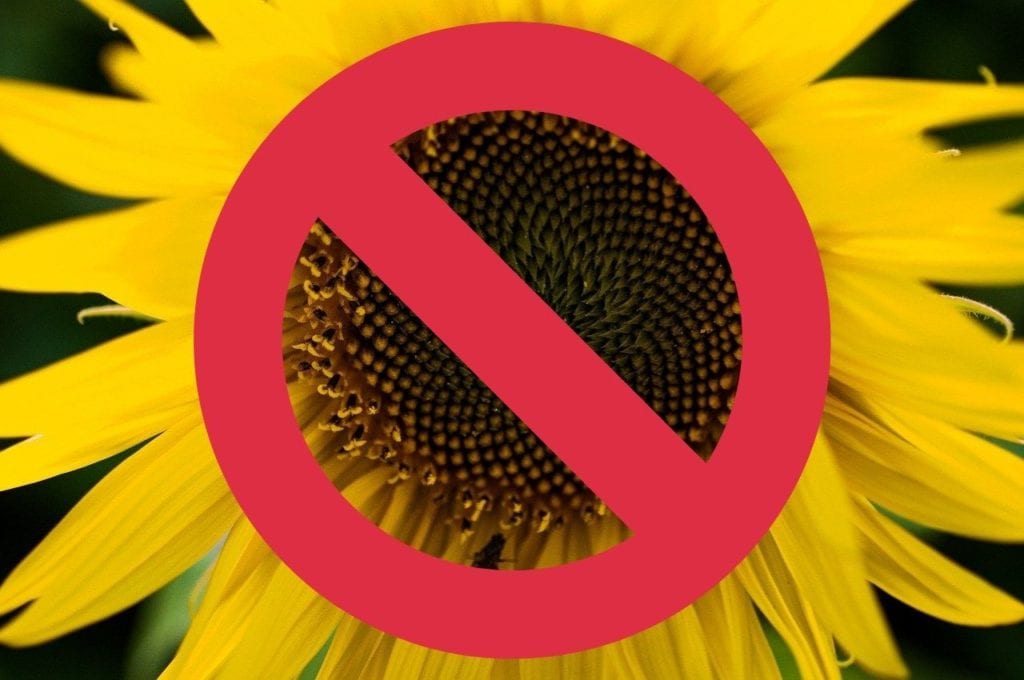

It is important to know which foods are good and which foods are toxic to your birds. If you want to know what you should not feed your budgie, check out our list of 23 surprising foods that are harmful to budgies.
Can you give a budgie protein powder?
Of the shelf protein powders, the type used by body builders can be a great source of protein for your budgie.
However, be very cautious when giving your budgies, baby birds or adult birds, protein powder as part of their diet.
Young budgies are naturally fed “crop milk” which is produced by both of their parents. But it is not the same as milk produced by mammals.
Budgies cannot digest lactose and it can cause them to have diarrhoea.
For this reason you need to make sure the protein powder is a vegan based protein powder, made from soy, chickpea or other vegetable based protein.
Protein powder has been specifically designed for humans, known by athletes to speed up recovery from exercise, to bulk up on muscle weight, and to repair damaged muscles and tissues.
Some protein powders contain creatine which has been reported to help birds gain weight.
Can you feed egg to your budgie?
Eggs are an easy and very nutritious source of high-quality protein for budgies, making them a cheap easy way to get extra protein into your budgie’s diet. You may have even seen mixes called egg food or egg biscuit for cage birds.
Even though adding some egg to your budgie’s diet is beneficial to your budgies, it shouldn’t be a key ingredient of their diet. You can serve it to them as a treat or when their little bodies require more protein such as when they are molting, producing crop milk, nesting, or in times of stress.
Just be aware that you should never feed your budgies raw egg due to the risk of salmonella, even if you have your own chickens laying eggs in your backyard. You can make their meals interesting by serving them either scrambled egg, boiled egg, or even a small omelette (just leave out the condiments).
Should you feed insects to your budgie?
In the Australian grasslands, budgie flocks do scavenge for food on the ground and will eat insects as a source of protein when they find them.
If you are feeding your budgies a balanced meal it is not vital to include insects, in their diet. But if you want to provide them with a snack then this is a great alternative fatty protein snack. However, if you are starting them on this treat at a bit of an older age, it might take them a little while to get used to a new food.
One of the easiest insects to purchase are freeze-dried mealworms which you can find at most pet stores or even some garden centers that have a bird section.
But the easiest way to get cheap mealworms is to buy them online through Amazon or other online pet supply stores.
If you would like to breed your own mealworms for your budgies, this is quite an easy thing to do and can keep you in constant supply.
Other insects that your budgies might enjoy include crickets, slaters, ant-pupae, spiders, and anything else they can find naturally in their cage.
The best plant sources of protein for a budgie
One of the best protein-rich foods you can provide your budgies with are sprouts, and if you grow them yourself, you can be assured that there are no added chemicals or pesticides that have been sprayed on them or leached from the soil into the beans.
Depending on where in the world you live, you might find that you’ll need to import some of your seeds. If so, check beforehand to see if they have been heat-treated because heat-treated seeds are effectively dead and will not sprout no matter how hard you try to get them to.
Sprouting seeds yourself is definitely one of the best ways to go. It’s easy and extremely cost-effective and your birds will love it. The best time to offer your sprouted seeds to your birds is after they have just sprouted as this is when they have the highest protein levels. Don’t wait too long to feed them to your birds because the more mature the sprouts are, the less nutritious they will be.
Other plant sources with high protein levels suitable to your budgies are spinach, broccoli, mung bean sprouts, cauliflower, corn, carrots, and herbs. If you can, leave the tops and the roots on the vegetables as budgies like to forage through this and pick through the sand.
TIP – Try tying some vegetables and plants to the sides of the aviary to encourage flight and climbing, allowing your budgies to exercise their wings and muscles.
If you really want to spoil them, try growing pots of spinach or other plants and place the pots or trays into their aviary to encourage them to fly down to the ground where they can forage as they would in the wild.
Delicious weeds that you can feed your birds include dandelions, milk thistle, and chickweed.
In Australia, where budgies are found in massive flocks in the wild, they naturally chew on Eucalyptus branches. If you can find a branch, you should place it inside their cage; they will appreciate this spoil.
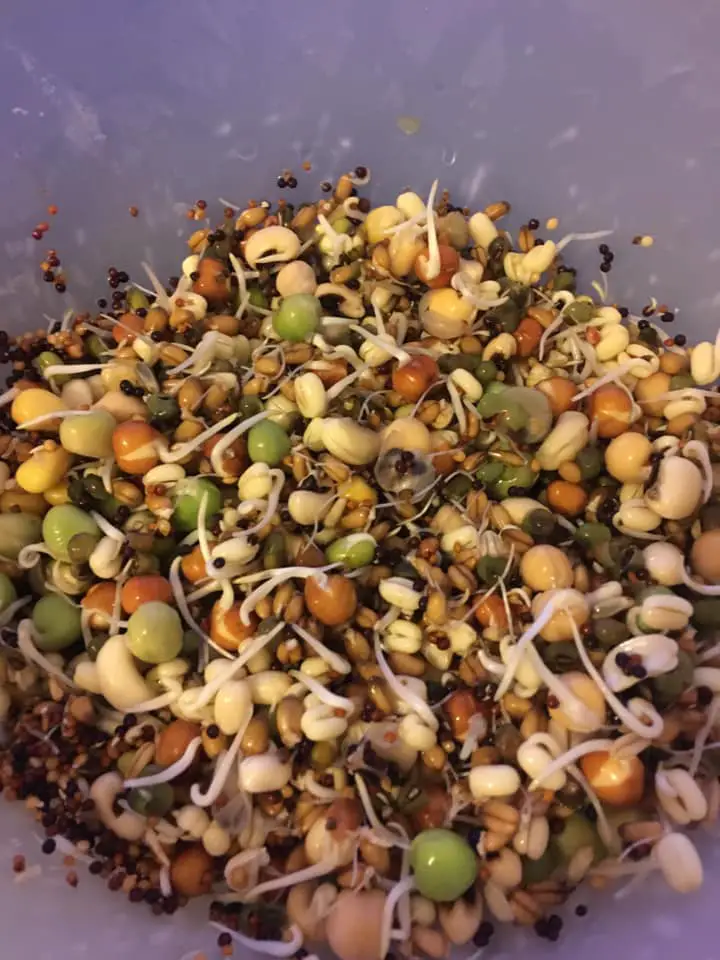



Is it okay to give your budgie fish and meat?
In the wild, budgies naturally include some small amounts of animal protein in their diet, as mentioned before most of this comes from small insects.
If you wanted to feed your birds an all-plant diet, you would need to do a significant amount of research to ensure that you include the correct proteins as an all-plant diet is not their natural diet in the wild.
Protein from animals provides additional nutrients and amino acids that are missing from an all-plant diet.
If a budgie dies in its aviary, and isn’t removed immediately the other budgies will pick at the carcass as a source of protein much in the same way that if a budgie has a broken feather that bleeds, it will chew on it.
Chicken Carcasses – If you have a chicken, or chicken pieces, boil them in water for 30 minutes and then bake them in the oven for an additional 30 minutes. This ensures all pieces are cooked. Leave the carcass to cool before throwing it into the cage for your budgies. They will happily feed and pick at the meat and smaller bones, leaving the larger bones for you to remove later. This is also a great source of calcium for your budgies.
Seafood protein – Many breeders and will give their budgies small amounts of tinned tuna or other fish to boost their protein intake. Tuna and sardines are also an excellent source of Omega-3 and Omega-6 fatty acids.
It is also possible to give your budgies fish meal, and shrimp flakes or small dried shrimp if you want to provide them with some variation. You can often find these in Asian grocery stores.
In conclusion
So in a proverbial nutshell, your feeding plan for your budgie should be to provide a good base of seeds and vegetables/ greens, and an animal-based protein source. If necessary, you can consider supplements to balance out vitamin and mineral requirements but if you are unsure you can check with your vet.
If your budgies are in a large cage or aviary, consider placing plants or even potted plants, on the ground for them to forage for insects and sprouts. This mimics their natural feeding patterns in the wild and will keep them interested in searching for their food.
Providing your birds with a balanced diet will maintain their weight and their health, and provide you with very happy, long-living beautiful budgies.
